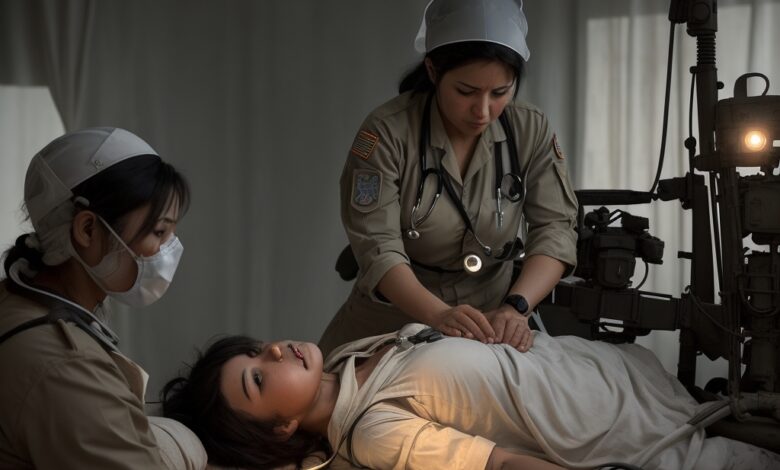Nursing in Conflict Zones: A Specialized Field

Table of Contents
War zones and conflict-ridden areas are not just battlegrounds for soldiers but also for the unsung heroes, healthcare professionals. Among them, nurses stand as frontline warriors, offering life-saving care in the heart of danger. But what really drives them to work under such life-threatening circumstances?
II. Historical Context
Delving into the annals of history, nurses have always played a pivotal role during wars. Imagine the time of the Crimean War, where Florence Nightingale became a beacon of hope, tending to wounded soldiers by the flickering light of her lamp. But it wasn’t just about nursing the sick back to health; it was about bringing a systemic change. With her team, Nightingale revolutionized wartime nursing, introducing sanitary practices that dramatically dropped mortality rates.
Through the ages, wars have morphed in character, but the undying spirit of nursing has remained constant. Whether it’s World War I or the modern-day conflicts in Syria, nurses have been there, stitching the fabric of society back together, one wound at a time.
III. Characteristics of Nursing in Conflict Zones
Picture this: bomb blasts resonating through the air, constant gunshots, and amidst all the chaos, a nurse is diligently suturing a wounded child’s leg. The world of nursing in conflict zones is unlike any other. The environment is charged, resources scarce, but the mission clear – save lives.
It’s not just about medical proficiency. It’s about being resourceful when supplies run out, about teaming up with anyone available, from surgeons to laymen, ensuring that care is delivered. And more than anything, it’s about making those heart-wrenching decisions when faced with overwhelming casualties.
IV. Challenges Faced by Nurses
“Every day was a test,” recalls a nurse who served in Yemen. From bombings to ambushes, the dangers were never-ending. But beyond the immediate physical threats, the emotional turmoil they experience is profound.
Imagine a scenario where a nurse has to decide which injured individual gets immediate attention, not because of the severity of their wounds but due to a shortage of medical supplies. Ethical dilemmas become daily battles. And if that’s not enough, the looming shadow of infectious diseases in makeshift camps adds another layer of complexity.
V. Necessary Skills and Training
You might wonder, how do these nurses prepare for such intense scenarios? While core nursing skills are foundational, training for conflict zones takes it up several notches. Trauma care, emergency response, and even cross-cultural understanding become paramount.
Nurses also undergo ethical training to help them navigate the murky waters of wartime decision-making. But it’s not just about skills and knowledge. It’s about building resilience, about preparing oneself emotionally and mentally for the harrowing experiences ahead.
VI. Psychological Impact and Coping Mechanisms
Remember the nurse from Yemen? Post her tenure, she mentioned battling nightmares and reliving traumatic events. The psychological aftermath of serving in conflict zones can be debilitating. But as they say, sharing heals. Many nurses participate in group therapy sessions, discussing their experiences, and finding solace in shared stories.
VII. The Broader Role of Nurses
Beyond immediate medical care, nurses in conflict zones wear many hats. They become educators, teaching local communities about sanitation and health. They bridge cultural divides, often becoming the voice of the voiceless, advocating for their patients’ rights against all odds.
VIII. Legal and Ethical Frameworks
Their bravery notwithstanding, international laws like the Geneva Conventions ensure that healthcare workers in conflict zones are protected. Yet, violations are not unheard of. Navigating these treacherous terrains requires a strong ethical compass, and nursing bodies worldwide provide guidelines to aid this journey.
IX. Case Studies
Take Syria, for instance. Amidst its ravaging civil war, stories of nurses emerging as the literal lifelines are plenty. They’ve not only provided medical care but have rebuilt shattered community structures, ensuring that even in war, life finds a way.
X. The Future of Nursing in Conflict Zones
While the role of a nurse remains grounded in care, the future sees an integration of technology and telemedicine, even in remote conflict areas. The vision is clear: no matter the circumstances, every individual deserves quality care.
XII. Insights from the Frontline: Personal Testimonies
Let’s dive deeper into the real-life accounts of those who’ve served on the battlefield, not with weapons but with syringes, bandages, and boundless compassion.
Jane from South Sudan: A midwife by profession, Jane witnessed the unfathomable. In a makeshift tent, she brought countless lives into a world torn apart by strife. But as she puts it, “Every birth was a statement. A statement that life goes on, regardless.”
Ahmed in Syria: He recalls an incident where, amidst a bombing raid, he performed a surgery with nothing but a flashlight. “The power was out. The building was shaking. But the heartbeats kept us going,” he mentions, emphasizing the tenacity needed to persist against all odds.
XIII. International Support and Collaboration
While nurses are the frontline heroes, they’re supported by an ensemble cast of international organizations. Groups like Médecins Sans Frontières (Doctors Without Borders) offer not just manpower but essential training and emotional support.
Collaborations between countries also see an exchange of medical expertise, ensuring that no matter where a nurse comes from, they’re prepared for the distinctive challenges of a conflict zone.
XIV. The Changing Face of Healthcare in War Zones
Modern conflicts have led to the evolution of healthcare delivery in these areas. Drones, once symbols of war, are now being used to drop medical supplies. Telemedicine, through satellite communications, allows consultations with specialists thousands of miles away.
And while the essence of nursing remains human touch and compassion, AI and advanced diagnostic tools are making inroads, ensuring that nurses are equipped with the best tools to save lives.
XV. Heroes Beyond the Spotlight
Every time a soldier is saved, there’s a nurse working tirelessly in the background. Every child that survives a gunshot, every mother who lives to see another day, every elder who’s given a few more years – behind each of these stories is the unwavering spirit of a nurse.
While movies and songs often eulogize the bravery of soldiers, it’s essential to remember and celebrate the nurses who, against all odds, ensure that in the midst of death and destruction, the heart of humanity continues to beat.
XVI. A Call to Action
It’s easy to read these accounts from the comfort of our homes and move on. But the real change occurs when we act. Advocating for better protective measures, donating to organizations that support medical care in conflict zones, or simply spreading awareness – every little bit counts.
As we wrap up this journey into the world of nursing in war-torn areas, remember that while the tales are many, the underlying theme remains the same – undying resilience, boundless compassion, and an unwavering commitment to life.
In every corner of our strife-ridden world, there are unsung heroes who remind us of the beauty of the human spirit. Their tales, fraught with danger, sadness, and hope, are testaments to the power of care and compassion. In celebrating them, we not only honor their sacrifices but also ignite a beacon of hope in these challenging times.




